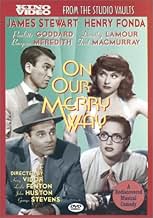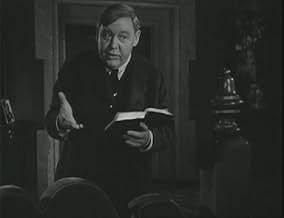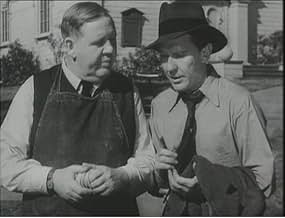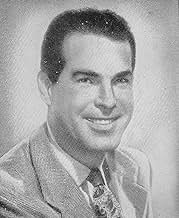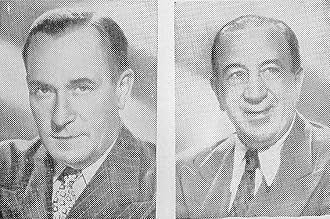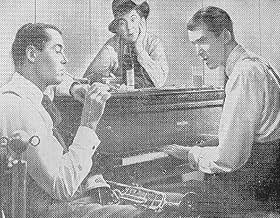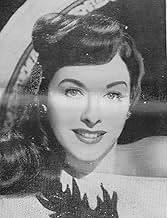AVALIAÇÃO DA IMDb
5,7/10
934
SUA AVALIAÇÃO
Adicionar um enredo no seu idiomaThree short stories revolving around the topic of the daily question posed by the roving reporter to the readers of a daily newspaper.Three short stories revolving around the topic of the daily question posed by the roving reporter to the readers of a daily newspaper.Three short stories revolving around the topic of the daily question posed by the roving reporter to the readers of a daily newspaper.
Carl 'Alfalfa' Switzer
- Leopold 'Zoot' Wirtz
- (as Carl Switzer)
Avaliações em destaque
As the "Trivia" section states, Charles Laughton was in the original version of this film under its title "A Miracle Can Happen". His was a sequence of 20 minutes or so which came between the Fonda/Stewart story and the one with Fred MacMurray which ended the movie. During the war, Laughton had taken to reading from great works of literature, including the Bible, to invalided US servicemen. He continued to give reading tours after the war and his appearance in "A Miracle Can Happen" was clearly an attempt to put one of his Bible readings on film. He played a washed-out minister who bores his congregation to tears, but one rainy night a small boy asks Laughton to visit his sick father. In an attempt to boost the dying man's spirits, Laughton rises to the occasion with an over-the-top delivery of the Saul and David story that completely revitalises the father. It then turned out that the little boy who invited Laughton in, but who has now disappeared from the scene, had died some years earlier. So, as Laughton told Meredith at the end of the sequence, "a miracle happened."
For whatever reason, the Laughton sequence was deleted from the US release but not before prints has been sent abroad to other countries. Consequently, it has long been known that, for example, a Spanish version of "A Miracle Can Happen" - with Laughton and all the others dubbed into that language - has been seen on TV in Spain and is now available there on DVD, complete with the original English dialogue.
With Laughton having been deleted, the Dorothy Lamour sequence was added in as a replacement, and the film was duly re-titled "On Our Merry Way." I agree with the sentiments expressed by others who find this film an embarrassment all round. Fonda and Stewart are no masters of farcical comedy and neither are any of the other principals. As for Laughton in the original film, his hamming up of the Bible story has to be seen to be believed. Nevertheless, both versions are of some interest because of the talents involved but I agree with anyone who says that once you've seen either version you're not likely to want to see them again!
For whatever reason, the Laughton sequence was deleted from the US release but not before prints has been sent abroad to other countries. Consequently, it has long been known that, for example, a Spanish version of "A Miracle Can Happen" - with Laughton and all the others dubbed into that language - has been seen on TV in Spain and is now available there on DVD, complete with the original English dialogue.
With Laughton having been deleted, the Dorothy Lamour sequence was added in as a replacement, and the film was duly re-titled "On Our Merry Way." I agree with the sentiments expressed by others who find this film an embarrassment all round. Fonda and Stewart are no masters of farcical comedy and neither are any of the other principals. As for Laughton in the original film, his hamming up of the Bible story has to be seen to be believed. Nevertheless, both versions are of some interest because of the talents involved but I agree with anyone who says that once you've seen either version you're not likely to want to see them again!
¨A Miracle Can Happen" was the original title of this film , it deals with a down-and-out reporter called Oliver Pease (Burguess Meredith) gets a dose of courage from his wife Martha (Paulette Goddard) as she suggests him an interesting inquiry : "Has a little child ever changed your life?" . Oliver gets answers from two slow-talking musicians (Henry Fonda and James Stewart) , the second sequence Charles Laughton played a bible-reading minister , and the third part about an itinerant couple (Fred MacMurray , William Demarest) who is deceived by a child . In each case the "little child" is hardly innocent: in the first, a local auto mechanic's "baby" results out to be fully developed as a beautiful girl ; in the second , an unfortunate church Minister (Charles Laughton) teaches a grumpy father (Henry Hull) to learn kindness by Bible reading ; in the third, the family of a spoiled brat doesn't want him returned . Did You Ever See A Miracle Walking?
This is a sketches movie full of humor , fun situations , entertainment and amusement . Interesting screenplay by Laurence Stallings and Lou Breslow based on original story by Arch Oboler . The picture is made up of many vignettes featuring many capable stars , it belongs to sub-genre about ¨anthology film¨ ; movies like "Flesh and Fantasy" and "O. Henry's Full House" used large casts to tell several interlocked stories , though "Tales of Manhattan" is the best of the anthology films , it follows the adventures of a tuxedo's tailcoat as it passes through the hands of several diverse people , being also starred by Laughton and Fonda . This ¨A miracle can happen¨ consisted of three short stories , about 20-25 minutes each , linked by the Burgess Meredith character. Titled "A Miracle Can Happen", this film debuted on February 3, 1948 at the Warner Theatre in Manhattan , during February, the feature also opened in Philadelphia and Detroit ; in June, when released nationally, the picture ran nine minutes shorter than its original 107 minutes, and the film's name had been changed to "On Our Merry Way," thus avoiding any religious connection that moviegoers might assume by seeing the word "miracle" in the title . Nice acting by Burguess Meredith as a misfit journalist pursued by a creditor , he writes lost pet notices and looking for a good scoop he tricks the editor of the newspaper . Sensational duo formed by Henry Fonda and James Stewart , they are fabulous as an amusing couple become involved into a funny contest . Charles Laughton plays masterfully an unlucky Minister ; however, this segment was eliminated in some copies with a parody of an actress whose roles usually feature a sarong as Dorothy Lamour's South Seas movies , as the powers-that-be decided to drop this 'religious' story altogether and it was replaced by a more comic one . Independent producer David O. Selznick offered to buy the film in order to issue the Laughton sequence as a short, scrapping the rest of the picture ; Selznick's plan was rejected by producer Benedict Bogeaus and producer-star Burgess Meredith . In Spain, "A Miracle Can Happen", complete with the original Laughton sequence intact but of course without the alternative Dorothy Lamour story , as it has been released on DVD there, and retains the English-language soundtrack, the movie can now been seen as it was originally intended .
Extraordinary support cast formed by notorious secondaries such as Harry James , Victor Moore , William Demarest , Hugh Herbert , Eduardo Ciannelli , Henry Hull , John Qualen and Carl 'Alfalfa' Switzer . The film has an atmospheric cinematography carried out by four prestigious cameramen as Joseph F. Biroc , Edward Cronjager , John F. Seitz and uncredited Ernest Laszlo . Evocative and appropriate original musical score by Heinz Roemheld . The motion picture was well directed by four classic Hollywood filmmakers as King Vidor, Leslie Fenton and, uncredited, John Huston and George Stevens . Rating : Good film , 6'5/10 .Well worth watching .
This is a sketches movie full of humor , fun situations , entertainment and amusement . Interesting screenplay by Laurence Stallings and Lou Breslow based on original story by Arch Oboler . The picture is made up of many vignettes featuring many capable stars , it belongs to sub-genre about ¨anthology film¨ ; movies like "Flesh and Fantasy" and "O. Henry's Full House" used large casts to tell several interlocked stories , though "Tales of Manhattan" is the best of the anthology films , it follows the adventures of a tuxedo's tailcoat as it passes through the hands of several diverse people , being also starred by Laughton and Fonda . This ¨A miracle can happen¨ consisted of three short stories , about 20-25 minutes each , linked by the Burgess Meredith character. Titled "A Miracle Can Happen", this film debuted on February 3, 1948 at the Warner Theatre in Manhattan , during February, the feature also opened in Philadelphia and Detroit ; in June, when released nationally, the picture ran nine minutes shorter than its original 107 minutes, and the film's name had been changed to "On Our Merry Way," thus avoiding any religious connection that moviegoers might assume by seeing the word "miracle" in the title . Nice acting by Burguess Meredith as a misfit journalist pursued by a creditor , he writes lost pet notices and looking for a good scoop he tricks the editor of the newspaper . Sensational duo formed by Henry Fonda and James Stewart , they are fabulous as an amusing couple become involved into a funny contest . Charles Laughton plays masterfully an unlucky Minister ; however, this segment was eliminated in some copies with a parody of an actress whose roles usually feature a sarong as Dorothy Lamour's South Seas movies , as the powers-that-be decided to drop this 'religious' story altogether and it was replaced by a more comic one . Independent producer David O. Selznick offered to buy the film in order to issue the Laughton sequence as a short, scrapping the rest of the picture ; Selznick's plan was rejected by producer Benedict Bogeaus and producer-star Burgess Meredith . In Spain, "A Miracle Can Happen", complete with the original Laughton sequence intact but of course without the alternative Dorothy Lamour story , as it has been released on DVD there, and retains the English-language soundtrack, the movie can now been seen as it was originally intended .
Extraordinary support cast formed by notorious secondaries such as Harry James , Victor Moore , William Demarest , Hugh Herbert , Eduardo Ciannelli , Henry Hull , John Qualen and Carl 'Alfalfa' Switzer . The film has an atmospheric cinematography carried out by four prestigious cameramen as Joseph F. Biroc , Edward Cronjager , John F. Seitz and uncredited Ernest Laszlo . Evocative and appropriate original musical score by Heinz Roemheld . The motion picture was well directed by four classic Hollywood filmmakers as King Vidor, Leslie Fenton and, uncredited, John Huston and George Stevens . Rating : Good film , 6'5/10 .Well worth watching .
Before I committed to buying the DVD of "On Our Merry Way," I got it from Netflix and happy I am that I did so, for it's not likely I'd ever want to watch it again. "On Our Merry Way" is an anthology film in the manner of "O. Henry's Full House," but while the latter has a no-nonsense framework with John Steinbeck introducing the episodes, "On Our Merry Way" uses the gimmick of Burgess Meredith talking directly to the camera every so often. It doesn't work; it seems more like a vanity project for Meredith and his then wife Paulette Goddard.
Nor do the stories work. They are shaggy dog stories that bore you long before they reach a conclusion. The Henry Fonda-James Stewart and Fred MacMurray-William Demarest episodes are simply not funny. "On Our Merry Way" is full of overacting (especially from Carl "Alfalfa" Switzer) and shtick (from Victor Moore and Hugh Herbert). Dorothy Lamour, on the other hand,comes off extremely well both as an addle-pated secretary and then with a song that satirizes her own career; for Lamour it's a triumph over inferior material.
John O'Hara is credited for one of the stories, O. Henry is not, even though his "The Ransom of Red Chief" serves as the basis for the MacMurray-Demarest episode; for comparison, watch the Fred Allen-Oscar Levant take on the same story in "O. Henry's Full House." It's only minimally better but it moves faster.
It's inconceivable to me that so many great directors, credited or un-, would produce such a mess.
One can't help be grateful to Kino for clearing the copyright problems which had long kept the film in limbo; after all, we do want to preserve the work of our great stars, no matter how bad. But once our curiosity is satisfied, "On Our Merry Way" becomes a shelve-it-and-forget-it film.
For a much better pairing of Meredith and Goddard, I'd recommend Jean Renoir's English-language version of "The Diary of a Chambermaid."
Nor do the stories work. They are shaggy dog stories that bore you long before they reach a conclusion. The Henry Fonda-James Stewart and Fred MacMurray-William Demarest episodes are simply not funny. "On Our Merry Way" is full of overacting (especially from Carl "Alfalfa" Switzer) and shtick (from Victor Moore and Hugh Herbert). Dorothy Lamour, on the other hand,comes off extremely well both as an addle-pated secretary and then with a song that satirizes her own career; for Lamour it's a triumph over inferior material.
John O'Hara is credited for one of the stories, O. Henry is not, even though his "The Ransom of Red Chief" serves as the basis for the MacMurray-Demarest episode; for comparison, watch the Fred Allen-Oscar Levant take on the same story in "O. Henry's Full House." It's only minimally better but it moves faster.
It's inconceivable to me that so many great directors, credited or un-, would produce such a mess.
One can't help be grateful to Kino for clearing the copyright problems which had long kept the film in limbo; after all, we do want to preserve the work of our great stars, no matter how bad. But once our curiosity is satisfied, "On Our Merry Way" becomes a shelve-it-and-forget-it film.
For a much better pairing of Meredith and Goddard, I'd recommend Jean Renoir's English-language version of "The Diary of a Chambermaid."
This three-vignettes-in-a-frame movie is not all bad. Indeed, the first segment features Henry Fonda and James Stewart in a brilliant comic pas de deux which leaves you wondering why they didn't become a cinematic pair. Given that the plot-ette they work with is unremarkable, their joint performance is even more of a miracle and a treat. Also fun is the little jazz score, which features not only Stewart doing his own tasteful piano comping, but also a guest appearance by Harry James, who not only provides the behind-the scenes music of the trumpet-playing "babe" but actually puts his mug in as well.
The second story is a bit weaker, though Dorothy Lamour does a song and dance number that sends up contemporary Hollywood clichés in a wittily sophisticated manner.
The last sequence, however, is truly lame: the pacing is slow and all the actors (especially child actor David Whorf) are annoying. The zany Hugh Herbert nicely finesses a small role but his little performance can't save the segment.
The frame itself is also uninspired, but not so deadly that it drags the film down.
Had the last two segments been as marvelous as the first, this entire movie would have been a classic. But in any case, you simply must see it for the Steward-Fonda collaboration. They command the film from the moment the camera turns on them and never disappoint.
The second story is a bit weaker, though Dorothy Lamour does a song and dance number that sends up contemporary Hollywood clichés in a wittily sophisticated manner.
The last sequence, however, is truly lame: the pacing is slow and all the actors (especially child actor David Whorf) are annoying. The zany Hugh Herbert nicely finesses a small role but his little performance can't save the segment.
The frame itself is also uninspired, but not so deadly that it drags the film down.
Had the last two segments been as marvelous as the first, this entire movie would have been a classic. But in any case, you simply must see it for the Steward-Fonda collaboration. They command the film from the moment the camera turns on them and never disappoint.
Read someone else saying it was ridiculous, basically, but I thought since full of good actors in really strange rolls, it might be interesting. It was as if someones unprofessional relative was producing, directing it, and all of the actors went along with it just for fun? Or something? I am a big enough fan of old movies and great actors that I am willing to go along for the ride. I got further along this time, than the first time. I generally look into the actors bios as I watch an old movie that I am unfamiliar with. The young woman in the bathing suit, playing the trumpet, was 6'2", I looked her up, bc I thought she looked very tall. I actually laughed a few times throughout the thing, but would not recommend it to anyone. I am just a diehard old movie, great old actor fan.
Você sabia?
- Curiosidades"A Miracle Can Happen" was the original title of this film when released on Feb. 3, 1948 at the Warner Theater in Manhattan. It consisted of three short stories (about 20-25 minutes each) linked by the Burgess Meredith character. He played a reporter looking for a good scoop, and in the second sequence, Charles Laughton played a bible-reading minister. When it was released nationally in June, however, it had been decided that the religious story would be dropped and replaced by a more comic one featuring Dorothy Lamour. The film in this new version was then re-titled "On Our Merry Way". However, prints of the original film had already been sent abroad for dubbing. In Spain, "A Miracle Can Happen" became "Una Encuesta Llamada Milagro", complete with the original Laughton sequence intact (but without the alternative Lamour story). As it has been released on DVD there and retains the English-language soundtrack, the movie can be seen as it was originally intended.
- Versões alternativasThe version released in Spain and always seen on both TV and DVD, in dubbed and subtitled versions (bearing the title card "A Miracle Can Happen"), includes the Charles Laughton episode but not the Dorothy Lamour one.
- ConexõesFeatured in Henry Fonda: The Man and His Movies (1982)
Principais escolhas
Faça login para avaliar e ver a lista de recomendações personalizadas
- How long is On Our Merry Way?Fornecido pela Alexa
Detalhes
- Data de lançamento
- País de origem
- Idioma
- Também conhecido como
- On Our Merry Way
- Locações de filme
- Empresa de produção
- Consulte mais créditos da empresa na IMDbPro
- Tempo de duração1 hora 47 minutos
- Cor
- Proporção
- 1.37 : 1
Contribua para esta página
Sugerir uma alteração ou adicionar conteúdo ausente

Principal brecha
By what name was No Nosso Alegre Caminho (1948) officially released in India in English?
Responda
